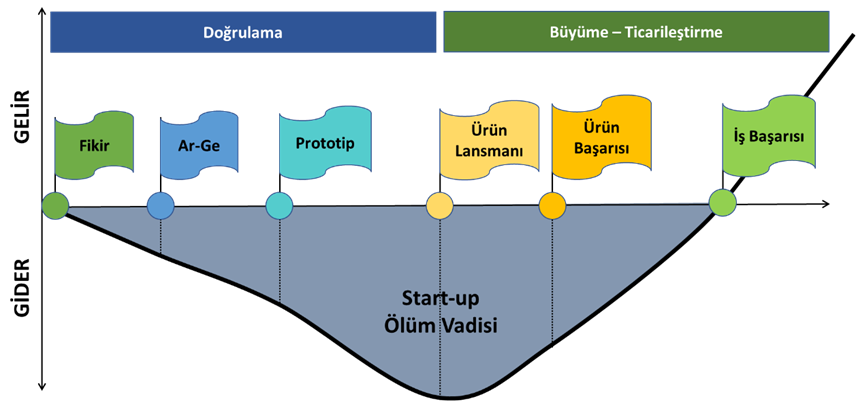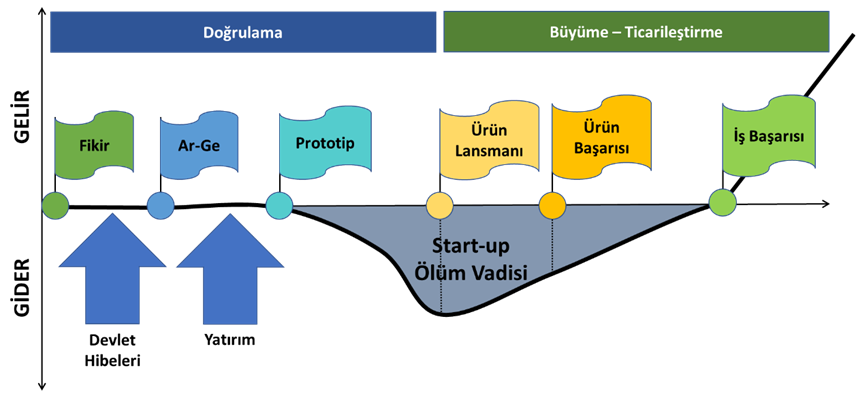1- Investments and Grants Do Not Make the Entrepreneur Money
Some entrepreneurs initially have the misconception that they can sustain their entrepreneurial journey solely through government grants and investments. However, these funds only protect startups from falling into the so-called “valley of death.” The valley of death refers to the critical period when a startup is struggling before generating revenue. Grants and investments (especially at the seed stage) help the startup survive during this period, usually keeping it at a break-even point. Real success for a startup (a commercial business) comes from generating revenue commercially. Revenue is fundamentally obtained by customers purchasing your product or service. Therefore, investments and grants should only be seen as lifelines, and the main goal should always be to sell your product or service to customers. Otherwise, your startup becomes perpetually dependent on external funding and faces inevitable failure in the long term.
“There is no such thing as a business without a customer. The purpose of a business is to create a customer.” – Peter Drucker


2- The Entrepreneur is the Most Important Component of the Startup
The most critical factor in a startup is the entrepreneur themself. Work packages come from projects, projects come from business ideas, business ideas come from the startup, and the startup comes from the entrepreneur. This hierarchy clearly illustrates the entrepreneur’s importance and role.

Projects are processes created to fund specific parts of business ideas or bring them to life through proper resource management. Often, a single business idea or product may not be sufficient for a startup’s sustainability. For startups to be sustainable and scalable, business ideas must continuously evolve. The entrepreneur, in terms of temperament and vision, must have the potential to generate new business ideas and ventures. An entrepreneur can exit a startup and use the funds to turn another business idea into a startup. The entrepreneur’s vision, skills, and level of commitment play a decisive role in the startup’s success. A good entrepreneur can quickly adapt to environmental changes, create new opportunities, and demonstrate flexibility at every stage of the startup. The entrepreneur is larger than the startup and is its most important component.
“People listen to you when they like you. They do business with you when they trust you.” – Zig Ziglar
3- While Waiting for Perfection: Move Fast and Enter the Market
Waiting for perfection is a common trap for entrepreneurs. Just like in Samuel Beckett’s Waiting for Godot, entrepreneurs may sometimes miss opportunities while waiting for perfection. As Beckett said, “At least one thing is certain; in an hour, it will be too late for everything.” A startup must act quickly, launch its product to the market as soon as possible, and establish it there. Collecting customer feedback quickly and improving the product accordingly is essential for successful marketing. Waiting for a perfect product in the lab or R&D department can make market opportunities disappear. If there is a significant problem that needs solving and the time to address it has come, chances are other researchers and entrepreneurs are trying to solve the same problem. Believing you are alone at this stage is, at best, optimism. Failures and mistakes are inevitable in this process; however, the important thing is to learn quickly from these mistakes and continue progressing. This does not mean launching a product that is unready and destined to fail; it means not holding back products that solve the target problem, have a complete scope, and continue to improve toward perfection. The key is to enter the market, gather real-world feedback, and develop the product based on that feedback.
